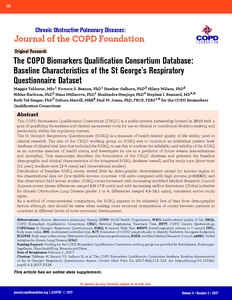Tabberer, M;
Benson, VS;
Gelhorn, H;
Wilson, H;
Karlsson, N;
Müllerova, H;
Menjoge, S;
Rennard, SI;
Tal-Singer, R;
Merrill, D;
et al.
Tabberer, M; Benson, VS; Gelhorn, H; Wilson, H; Karlsson, N; Müllerova, H; Menjoge, S; Rennard, SI; Tal-Singer, R; Merrill, D; Jones, PW
(2017)
The COPD Biomarkers Qualification Consortium Database: Baseline Characteristics of the St George's Respiratory Questionnaire Dataset.
Chronic Obstr Pulm Dis, 4 (2).
pp. 112-123.
ISSN 2372-952X
https://doi.org/10.15326/jcopdf.4.2.2017.0128
SGUL Authors: Jones, Paul Wyatt
![[img]](https://openaccess.sgul.ac.uk/109134/1.hassmallThumbnailVersion/JCOPDF-2017-0128-Tabberer2.pdf)  Preview |
|
PDF
Published Version
Available under License ["licenses_description_publisher" not defined].
Download (4MB)
| Preview
|
Abstract
The COPD Biomarkers Qualification Consortium (CBQC) is a public-private partnership formed in 2010 with a goal of qualifying biomarkers and clinical assessment tools for use in clinical or nonclinical decision-making and particularly within the regulatory context. The St George's Respiratory Questionnaire (SGRQ) is a measure of health-related quality of life widely used in clinical research. The aim of the CBQC working group on SGRQ was to construct an individual patient level database of clinical trial data that included the SGRQ, to use this to confirm the reliability and validity of the SGRQ as an outcome measure of health status, and investigate its use as a predictor of future events (exacerbations and mortality). This manuscript describes the formulation of the CBQC database and presents the baseline demographic and clinical characteristics of the integrated SGRQ database overall, and by study type (short-term [≤1 year], medium-term [2-4 years] and observational studies). Distribution of baseline SGRQ scores varied little by demographic determinants except for income region in the observational data set (low-middle income countries +10 units compared with high income, p<0.0001) and this observation held across studies. SGRQ scores increased with increasing modified Medical Research Council dyspnea scores (mean differences ranged 6.9-17.9 units) and with increasing airflow limitations (Global initiative for chronic Obstructive Lung Disease grades 1 to 4; differences ranged 4.5-16.1 units), consistent across study types. As a method of cross-sectional comparison, the SGRQ appears to be relatively free of bias from demographic factors although care should be taken when making cross sectional comparisons of scores between patients in countries at different levels of socio-economic development/.
Statistics
Item downloaded times since 14 Sep 2017.
Actions (login required)
 |
Edit Item |



